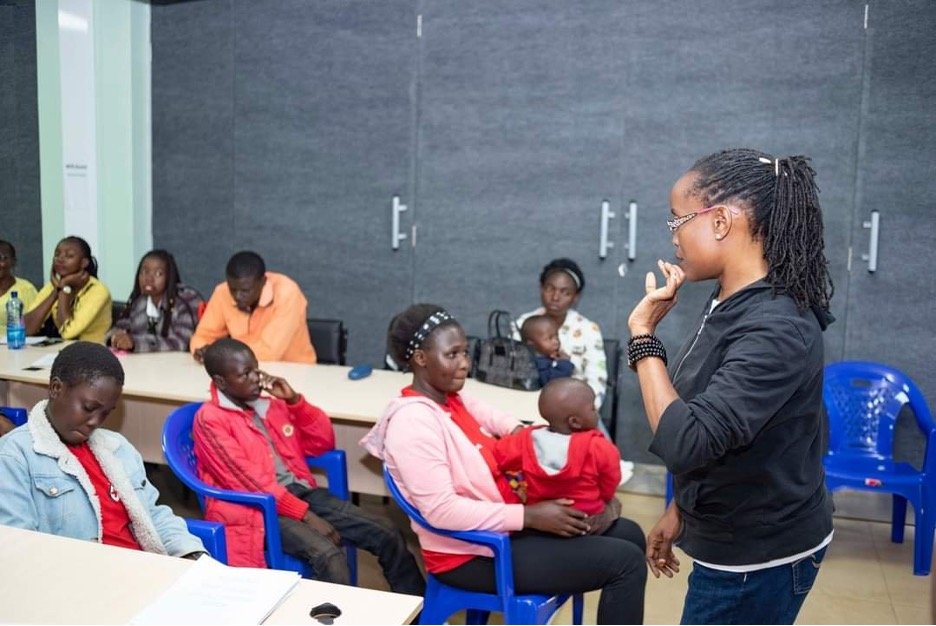Stronger Together: The Power of Patient Organizers in the Fight for Global Health Justice
Eunice Owino, a Voices for PEN-Plus advocate and co-author of “Embodied Contradictions, Structural Power: Patient Organizers in the Movement for Global Health Justice,” works with a support group of people living with sickle cell disease and their caregivers at Moi Teaching and Referral Hospital in Eldoret, Kenya.
“People living with chronic conditions have historically not been considered important decision-makers from a policy perspective,” said Dr. Apoorva Gomber, coauthor of an opinion piece recently published in PLOS Global Public Health. “Our article highlights the absurdity of policymakers making decisions aimed at benefitting people living with a certain disease without consulting anyone who actually lives with that disease.”
Published in November, the piece “Embodied Contradictions, Structural Power: Patient Organizers in the Movement for Global Health Justice” emphasizes patient organizers’ critical role in challenging and transforming the current paradigm of global health governance. “This paradigm,” added Dr. Gomber, who serves as associate advocacy director of the NCDI Poverty Network, “is woefully inadequate in meeting the health needs of most people.”
The article’s authors—global health advocates affiliated with the NCDI Poverty Network—point out the stark inequities and power imbalances rooted within the global health system that undervalues the lives of Indigenous, Black, brown, and Latino people, especially those living in underserved areas in the Global South. The authors deem the current global health governance system inadequate and inequitable for myriad reasons, including:
An insufficient capital allocation for effective caregiving;
The dominance of fragmented caregiving systems provided by global institutional philanthropy that focus only on “cost-effectiveness;” and
Funding limitations that dampen the political aspirations of patients, providers, and planners.
Despite historical attempts to address these issues, the authors contend, transformative efforts have largely failed, leaving significant portions of the global population without access to essential health services. The authors further argue that the efforts of patient organizers—people living with diseases and their allies—who build campaigns to address systemic issues can teach us essential lessons about scaling movements for global health justice.
The article emphasizes the importance of patient organizers in driving what sociologists call embodied health movements.
“People who live with—or ‘embody’—a certain disease share that challenge with others who live with the same disease,” said Dr. Jonathan Shaffer, one of the article’s authors and an assistant professor of sociology at the University of Vermont. “That common problem creates a powerful entry point for the solidarity needed to build a formidable social movement. Embodied social movements use the social reality of shared illness as the basis of organizing potential, whereby communities can work together and challenge the people, the institutions, and the policies that prevent their shared problem from being solved.”
Dr. Gomber noted that the authors are excited by the potential of the NCDI Poverty Network to change the power structure in global health systems by empowering ministries of health to build health systems according to the needs of their citizens and providing the capital to do so. Through advocacy initiatives such as Voices for PEN-Plus, she said, the Network encourages patient organizers to play a more prominent role in regional and global dialogues, expanding conceptions of international solidarity.
“Initiatives like Voices for PEN-Plus challenge the status quo, which has left the voices of people living with severe, chronic conditions out of the policy decisions that affect them,” said Dr. Gomber, who leads the Voices for PEN-Plus program. “Real, meaningful involvement from people living with these conditions that account for cultural and regional nuances will ensure the sustainability of health systems.”
The authors draw on their experiences working alongside patient organizers to outline key lessons for scaling movements for health justice. They underscore the importance of building interdependent teams, using storytelling to increase emotional capacity, and developing shared strategies for change.
“The Voices for PEN-Plus program is a great example of structured organizing,” said Dr. Shaffer. “The NCDI Poverty Network has brought together a team of health advocates from around the world living with NCDs. And each of these advocates has a strong network of local patient activists who are hungry to collaborate with others living with severe, chronic NCDs and advocate for their needs as a collective.”
Dr. Gomber agreed. “Although the Voices for PEN-Plus advocates come from different backgrounds and situations, we share strategic goals,” she said. “Together, they’re learning the basics of community organizing and developing shared stories. They’ll then apply those skills when running centrally coordinated campaigns across each country. It’s a huge opportunity for patient-activist organizing.”
Despite patient organizers’ significant impact on health justice promotion, the article notes challenges such as insufficient resources and a lack of formal support for enhancing skills. The authors implore policymakers and donors to recognize the potential for positive change that patient organizers represent.
“Our article is a call to action,” Dr. Gomber said. “We’re urging stakeholders to reconsider the value of grassroots movements in shaping the future of global health governance and ensuring healthcare as a fundamental human right. We’re stronger together. By organizing across disease communities, we can dismantle oppressive systems and achieve health justice worldwide.”

